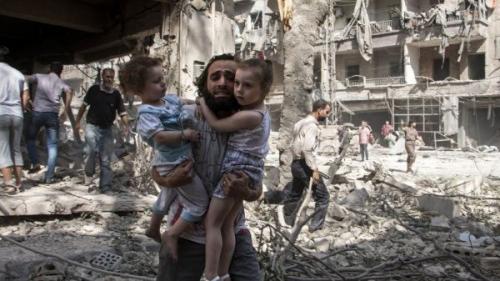Corporate totalitarianism and the new face of war
The enormous demographic growth experienced over the past hundred years and the massive migrations have led to some politicians, economists and security advisers to propose increasing the controls in place through systematic genocides.
- Opinión

«In a war the same ones always lose» is a phrase spoken in a scene from the Spanish film Soldados de Salamina (Soldiers of Salamina) and reflects what has been a constant in every armed conflict produced in any place on our planet; that is to say, the losers are those who have the misfortune of not having sufficient resources to avoid being the victims of the violence and destruction unleashed.
What in past times have been catalogued as correct methods of making war have been substituted by others, in this same period, that are condemnable from every ethical and moral point of view, given the unnecessary excess of cruelty, destruction and deaths of people of any age, observed during the Second World War and later in the Vietnam War. At present, no one is surprised at the outrages committed daily against whole defenseless populations that have become targets and scenarios of armed conflict, generally spurred on by Western powers, with the United States at the head, as has occurred for decades in the Middle East, without any definitive solution in sight.
All this represents a new methodology for domination, unlikely as it may seem. One cannot ignore the utilization of new and improved methods of control over the lives of whole populations; often without their realizing what has happened. The evolution of politics to a political-economy (based, above all, on the postulates of the neoliberal economy) instigates –because it requires it– the homogenization of the different social groupings, irrespective of their ethical, anthropological, cultural and/or religious characteristics; which explains in part the xenophobic and racist expressions that have flourished in Europe and the United States in the past two decades, legitimated by a war against terrorism that, incidentally, only their governments are authorized to decree and put into operation. It is a process of disciplining that draws on every kind of juridical-legal, religious, propagandistic, media, ideological and psychological resource, which end up molding every individual to the measure of the requirements of the new corporate economic-political power. As Michel Foucault said, “discipline, of course, analyzes, takes apart individuals, places, times, gestures and operations. It breaks them down into elements that are sufficient to perceive them on the one hand and modify them on the other”. To this end, it is essential to inculcate among people the compulsive desire to obtain and enjoy material goods, even beyond their own dignity, which drives them to selfishness and the abandonment of any expression of humanity and solidarity with respect to others.
Far from preserving and underlining the particularity of each person (in a broad and desirable sense) the goal is for them to be and act as a mass, to be able to channel them collectively, so that they respond in a docile and resigned way to the designs of those who govern them. The present dominance of security devices contributes to this process, justified by the fear of becoming victims of terrorism that, as has already been demonstrated a while back, are stimulated, supported, trained, financed and armed by the governments of the United States and Western Europe. All this in the name of freedom and democracy.
The enormous demographic growth experienced over the past hundred years and the massive migrations to the United States and European countries have led to some politicians, economists and security advisers to propose increasing the controls in place through systematic genocides. This would enhance the possibility of fulfilling their desire to influence, dominate and control individuals and social groups in every aspect. In this way, the dominant groups, those who benefit from this globalizing economic/political power, guarantee the safeguard of their hegemony and the structure of domination that makes it feasible. This, we could conclude, would lead the world to corporate totalitarianism, perhaps not in the manner described by George Orwell in his dystopia 1984, but something very similar, which would impose on humanity that same identity or logic.
21/06/2017
(Translated for ALAI by Jordan Bishop)
Del mismo autor
- El repunte económico y el empoderamiento popular 11/02/2022
- ¿Qué es lo más importante: el referéndum revocatorio o la recuperación económica? 21/01/2022
- El declive estadounidense, China y el auge decolonial 08/10/2021
- Latinoamérica, entre perspectivas y esperanzas 17/09/2021
- Nuestra América y la relectura de la historia 09/09/2021
- El legado insumiso de Simón Bolívar 27/08/2021
- El apocalipsis "ignorado" de la humanidad 20/08/2021
- ¿Hegemonía imperial o emancipación decolonial? 13/08/2021
- La visibilización y el reconocimiento de la diversidad 05/08/2021
- Maestros y esclavos o el nuevo capitalismo moral 29/07/2021
Guerra y Paz
- Prabir Purkayastha 08/04/2022
- Prabir Purkayastha 08/04/2022
- Adolfo Pérez Esquivel 06/04/2022
- Adolfo Pérez Esquivel 05/04/2022
- Vijay Prashad 04/04/2022








